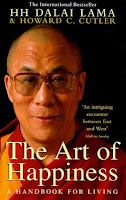 I had the privilege this week to attend an event at which His Holiness the Dalai Lama spoke. Change Your Mind Change The World was sponsored by the UW-Madison’s Center for Investigating Healthy Minds and the Global Health Institute. The event was held at the Overture Center in Madison, Wisconsin. What I attended was the first of two panel discussions being held that day, both of which featured the Dalai Lama.
I had the privilege this week to attend an event at which His Holiness the Dalai Lama spoke. Change Your Mind Change The World was sponsored by the UW-Madison’s Center for Investigating Healthy Minds and the Global Health Institute. The event was held at the Overture Center in Madison, Wisconsin. What I attended was the first of two panel discussions being held that day, both of which featured the Dalai Lama.
The focus of the morning discussion was on global health and sustainable well-being. The panelists in the afternoon held conversations on science, happiness, and well-being.
A Buddhist monk, Tenzin Gyatso is the 14th Dalai Lama. In this position he is the spiritual leader of Tibet, but he is recognized world-wide as an intellectual, a Buddhist philosopher and author, and a promoter of peace, non-violence, compassion, and inter-religious understanding. In fact, he was awarded the Nobel Peace Prize in 1989. He has been in exile, living in Dharamsala, India, since 1959, after the Chinese takeover of Tibet.
His Holiness had a busy two days in Madison. The day before the Overture event, he’d had a private meeting with Governor Scott Walker. Later he spoke to the combined State Legislature about democracy, equality, and compassion. In between those two events he spoke for well over two hours to a sold-out audience of 3,500 at the Alliant Energy Center.
The UW Center for Investigating Healthy Minds, which sponsored the event I attended, was founded by Professor Richard J. Davidson, Director of the Waisman Laboratory for Brain Imaging and Behavior and the Laboratory for Affective Neuroscience. According to the program notes, Davidson had been doing research on depression, anxiety, and fear. In 1992 he met the Dalai Lama who challenged him to use the same rigorous, scientific methods was using to study negative qualities of the mind to investigate positive qualities of the mind, such as kindness and compassion. Davidson took the Dalai Lama up on his challenge, going beyond simply studying healthy qualities of mind to exploring how these positive qualities can be cultivated on an individual and global scale using an interdisciplinary team of scientists. One of their studies has impacted the school at which I work; it is a “kindness curriculum” which is being implemented in our 4K classrooms. The Center also has projects in the Wisconsin prison system and works with returning veterans, cultivating healthy qualities of mind through mental skills training.
The work the Center for Investigating Healthy Minds is doing is immensely important, as is that of the Global Health Institute. And inviting the Dalai Lama to be a participant in a panel discussion was an excellent way to bring attention to their work and their need for public support. However, the two panels, other than the inclusion of the Dalai Lama, were disappointingly lacking in diversity. The six panelists—five men and one woman—are all outstanding and well-regarded in their respective fields. But it would have been interesting to have heard from someone from Africa, for instance, or Latin-America to get a broader perspective.
However, my goal was to hear the Dalai Lama in person; to experience his wisdom, his personality, his sense of humor for myself. It’s a huge job to attempt to change minds and change the world. But even in his seventh decade, this master philosopher and spiritual leader continually proves that he is up to the challenge. I only hope that those in power, such as the governor and the state legislature, are up to the challenge of listening with an open mind.


A great post Peggy. The Dalai Lama has proved to be a man able to speak to all levels of society and touch their heart. I hope now that those in power are able to act on his words.
I know that Dalai Lama's of ten reach great ages Peggy but somehow I don't think they're as long lived as Methuselah. Perhaps you meant he was in his seventieth year rather than decade? LOL
xx Hugs xx
Thanks for catching that, Lord David! The error has been fixed. And thank you for your comment. I hope I get the opportunity to hear His Holiness speak again. I have much to learn from him.
Definitely this is really a great positive experience to learn something good from experienced and well-known personalities. In this above article also we can get some quick overview on happiness present by the very well-known popular Dalai Lama. I hope these points are able to bring some positive changes in our life and put some light in our thoughts.